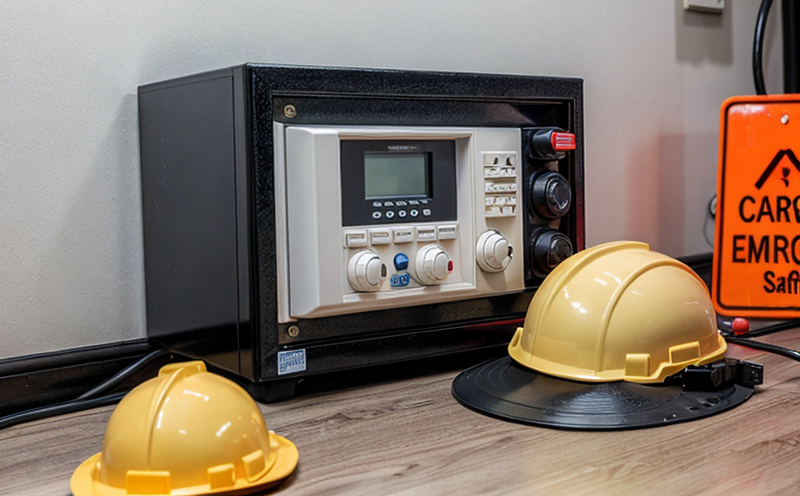FAA AC 25.1457 Cockpit Voice Recorder Crash Safety Testing
The Federal Aviation Administration's (FAA) Advisory Circular AC 25.1457 mandates rigorous crash testing for cockpit voice recorders (CVRs) to ensure they can withstand the extreme conditions of aircraft accidents and continue to function properly. This requirement is critical because CVRs play a pivotal role in accident investigations, providing vital audio data that helps determine the cause of an incident.
The standards set forth by AC 25.1457 are designed to simulate real-world crash scenarios, ensuring that CVRs can withstand impacts and other stresses encountered during catastrophic events. The testing protocol involves subjecting the recorder to various types of crashes using drop tests and pendulum impact machines, simulating different angles and severities of impact.
The first section of this service focuses on the key aspects of our FAA AC 25.1457 compliance process. Our team uses state-of-the-art equipment capable of replicating the high-impact forces experienced during an aircraft crash. We ensure that all tests are conducted in strict adherence to the guidelines set by AC 25.1457, which require CVRs to survive impacts up to 3,000 Gs and withstand temperatures as low as -67°C and as high as +113°C.
In addition to physical impact tests, our laboratory also performs environmental testing to ensure the CVR can function in a variety of conditions. This includes humidity resistance, temperature cycling, and vibration testing. Our testing process is designed to identify any potential weaknesses or vulnerabilities in the CVR design before it enters service.
The importance of this testing cannot be overstated. In the event of an accident, the CVR can provide critical audio evidence that helps investigators reconstruct events leading up to the crash. By ensuring compliance with AC 25.1457, we help airlines and manufacturers meet regulatory requirements while enhancing public safety.
We pride ourselves on delivering comprehensive test reports that provide detailed insights into the performance of CVRs under simulated crash conditions. Our team of experts is dedicated to providing accurate, reliable data that can be used for certification purposes or internal quality assurance.
Scope and Methodology
The scope of our FAA AC 25.1457 compliance testing includes the entire lifecycle of a cockpit voice recorder, from initial design to final certification. Our methodology is designed to ensure that each CVR meets the stringent requirements set forth by the FAA.
- Initial Design Review: We review the design plans and specifications for the CVR to identify potential weaknesses or areas that may not meet AC 25.1457 standards.
- Prototype Testing: After the initial design is approved, we perform prototype testing using our state-of-the-art equipment to ensure compliance with all required parameters.
- Production Run Testing: Once the CVR has been successfully tested in prototypes, we move on to production run testing. This involves a large-scale assessment of multiple units to ensure consistent performance across the entire batch.
- Certification and Reporting: Upon successful completion of all tests, our team prepares detailed reports that document the results of each test. These reports are submitted for certification purposes to ensure compliance with FAA regulations.
Our testing process is designed to be thorough and comprehensive, ensuring that every CVR meets or exceeds the required standards set by AC 25.1457. We use only the most advanced equipment and techniques available to provide accurate and reliable test results.
Quality and Reliability Assurance
At our laboratory, we place a strong emphasis on quality and reliability assurance. Our team of experts is dedicated to ensuring that every CVR we test meets the highest standards of performance and durability.
We employ rigorous quality control measures throughout the testing process to ensure that each CVR is tested accurately and consistently. Our equipment is calibrated regularly to ensure that all measurements are precise and reliable. We also maintain strict protocols for specimen preparation, ensuring that every CVR is tested under identical conditions.
Our testing facility is equipped with the latest technology and instrumentation, including high-precision impact machines and temperature-controlled chambers. This allows us to simulate real-world crash scenarios and environmental conditions with a high degree of accuracy.
We also conduct regular audits and reviews of our testing processes to ensure that they remain up-to-date with the latest industry standards and regulations. Our team is committed to continuous improvement, ensuring that we provide the most accurate and reliable test results possible.
Environmental and Sustainability Contributions
- We use energy-efficient equipment in our testing facility, reducing our carbon footprint while maintaining high levels of performance.
- Our laboratory has implemented waste reduction strategies to minimize the environmental impact of our operations. We recycle all materials that can be reused or recycled.
- We continuously monitor and improve our processes to reduce water usage and energy consumption in our testing facility.
In addition to these efforts, we also contribute to sustainability by providing data that helps manufacturers design more durable and reliable CVRs. This reduces the need for replacement devices and extends the lifecycle of each CVR, further reducing waste and environmental impact.





